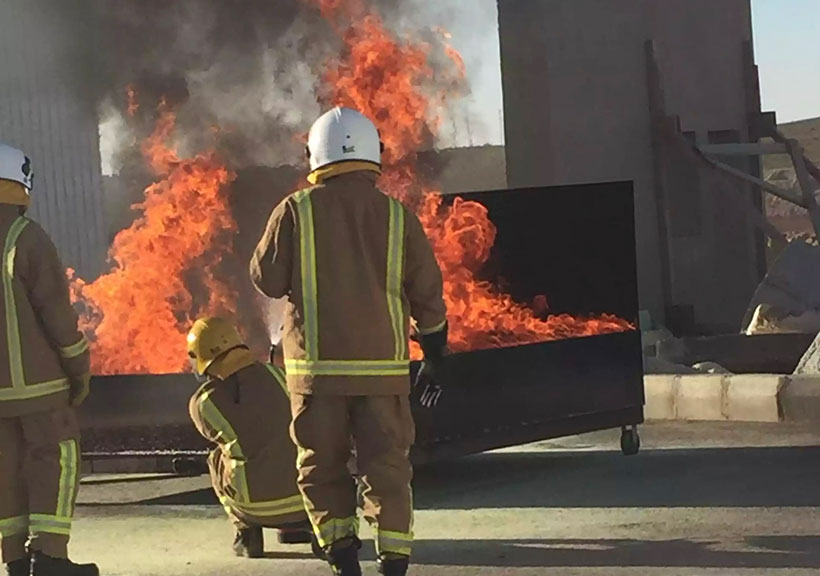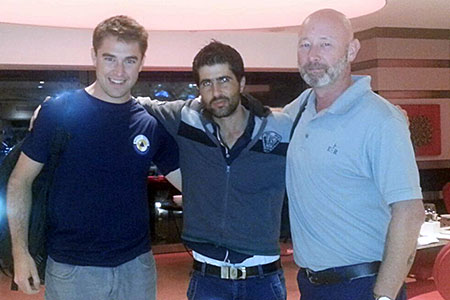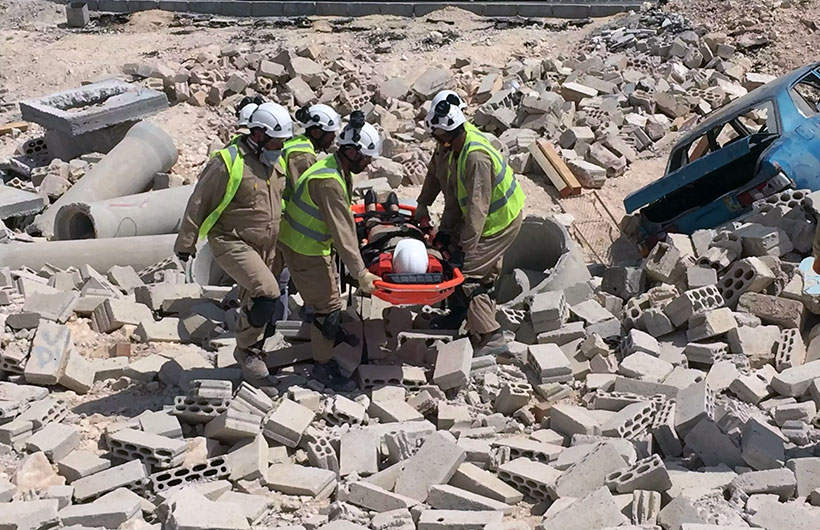When James Fromson ’13 and Emma Broches ’14 took the same Arabic class at Amherst, they’d yet to learn the words that would cram their vocabulary a few years later. Like al-bahth w al-enqath, for instance, which means “search and rescue.” Like sayarat al-etfa’a, or “fire truck.” Then came the Arabic equivalents for “bandage,” “stretcher,” “gas mask.” For “front-loader,” for “ambulance.” These terms became all too familiar after first Fromson and then Broches wound up in Amman, Jordan, to spend a life-transforming year at the organization Mayday Rescue.
In NGO-speak, Mayday is an “implementing partner.” It raises funds, donates equipment and provides training for Syria’s remarkable wartime first-responder group, whose formal name is the Syria Civil Defence.
Its informal—and now famous—name is the White Helmets. Dubbed for the protective headgear furnished by Mayday, the White Helmets have been much in the news. There are some 3,000 men and women, fanned across this ravaged country, who sprint to help those injured by bombs or missile strikes or chemical attacks, hauling people out of the rubble, tending their wounds, dousing fires. The White Helmets are former bakers, electricians, tailors, farmers—average Syrians who couldn’t or wouldn’t leave their country. They are unarmed and neutral. They rescue anyone, no matter the person’s role in the conflict. Their motto is, “To save one life is to save all of humanity.”
Nicholas Kristof from The New York Times said it right: “Who would have thought there could be an uplifting story from Syria?”
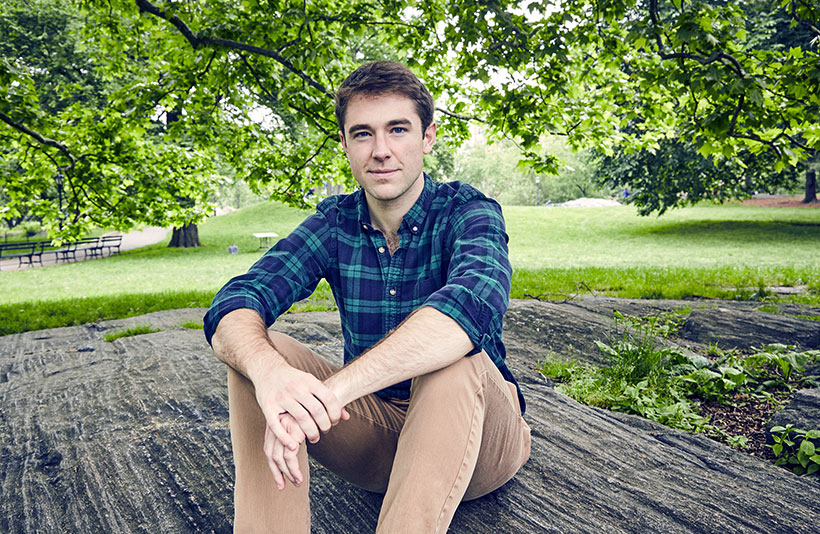
In 2016, the group won the Right Livelihood Award, considered an alternative to the Nobel Peace Prize. In 2017, their story charged two powerful films: The White Helmets, which won an Oscar for Best Documentary (Short Subject), and Last Men in Aleppo. Since being founded in 2013, the White Helmets have, as I write this, saved 114,431 lives.
To define the role played by these two young Amherst alumni, it makes sense to cite an old Syrian proverb: “He who has his hand in the water is not like him who has his hand in the fire.” Broches and Fromson never had their hands in the fire, did not enter Syria, did not risk their lives on rescue missions.
It was inspiring to help people who were a “light in the darkness.” But the work could also be hard and depressing.
Rather, they helped those who did. Each pulled off an intense, surreal, improvisatory range of support work at White Helmets emergency rescue training facilities in areas just outside of Syria. Fromson signed on from 2015 to mid-2016, and Broches stepped in as he left, staying for a year.
When I asked what a typical day was like at Mayday, each laughed kindly at my foolishness. “There was no typical day,” said Broches. “Every day was totally a new day.” They did everything from role-play bomb victims so the White Helmets could hone their rescue techniques, to puzzle out how to spirit donated fire trucks across the beset Syrian border. One day, Broches would wrangle a shipment of bandages; the next, she’d meet visiting luminaries. One day, Fromson would negotiate with an ambulance salesman trying to rip him off; the next, he’d rush an ailing White Helmet from the desert to the hospital, and trot out another Arabic term not so useful at Amherst: modad ladghat al-aqrab. That means “scorpion bite antidote.”
While Mayday’s emergency response and firefighting experts trained groups of 50 or so White Helmets one month at a time, “Emma and I kind of represented everything that’s not technical,” explains Fromson. “So, the research capacity, the translation capacity, translating in meetings, sequential translation, procurement, all kinds of stuff.”
And tons and tons of logistics. “‘Logistics’ sounds really bland,” concedes Fromson. “But logistics is where all the stories are.”
The three of us had a long, lively conversation by Skype: me in a conference room in Amherst; Broches in Cambridge, Mass., where she is a law student at Harvard; and Fromson in Muscat, in the Sultanate of Oman, where he is a Princeton master’s student on a fellowship, studying foreign policy and intensive Arabic. During our call, Fromson’s face sometimes went cubist as the connection faltered—there are some 7,000 miles between us, after all—but no glitch could hide the pair’s easy friendship. It seemed to be partly based on temperament: Broches is calmer, Fromson more effusive, but both are charming, funny and full of heart. It’s also based on an uncanny skein of shared experiences.
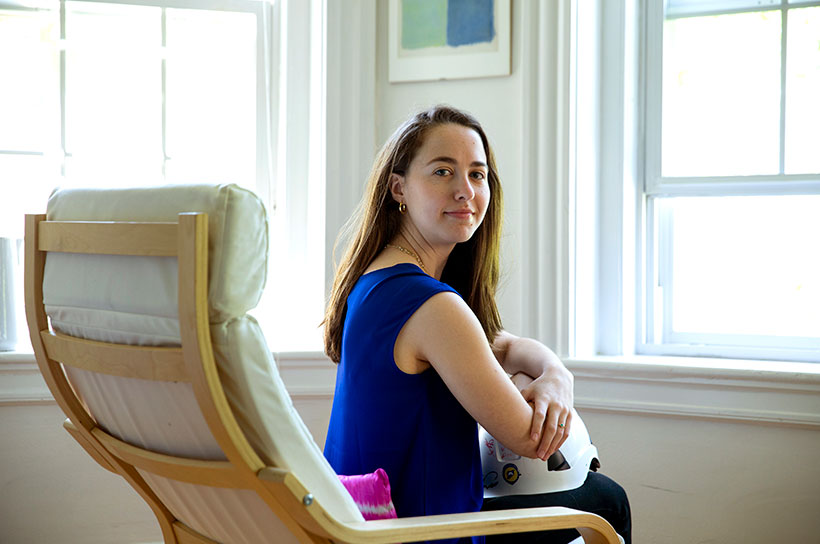
Emma Broches ’14 is now a student at Harvard Law. A history major at Amherst, she studies Arabic and arrived in Jordan on a Fulbright. Photo by Jessica Scranton.
They’re both native New Yorkers, history majors who speak impressive Arabic. (Fromson double-majored in Asian languages and civilizations.) Both have lived in the Middle East and wrote Amherst theses set therein: Broches researched how the Muslim Brotherhood views women, while Fromson studied the minority Shia communities in Iraq and Lebanon. Both remain in close touch with Amherst’s Monica Ringer, professor of history and Asian languages and civilizations, and Mohamed Hassan, senior lecturer in Arabic and director of the Five College Arabic
Program.
The parallels kept spooling out after Amherst. After leaving first jobs (Broches restless as a paralegal, Fromson itchy at the Council on Foreign Relations), they both got Fulbright scholarships to pursue further study in the Middle East, loosely based on their Amherst thesis topics. They separately headed to Amman but lived in the same apartment building, brightly full of Fulbrights, in the city’s Weibdeh neighborhood. Fromson joked to Broches, “On paper, you and I are basically the same person.”
And how did they end up at Mayday? Because their Fulbright research plans gave way, understandably, to the worst humanitarian crisis since World War II. Amman is only an hour’s drive from the Syrian border. On the ground, the refugee crisis was hard to ignore. While supported by her Fulbright, Broches signed on at the Jordan office of Humanitarian Research Services, a consultancy that works in conflict zones. Broches’ area of responsibility was Southern Syria, and her resulting expertise “was perfect for a transition to Mayday.”

